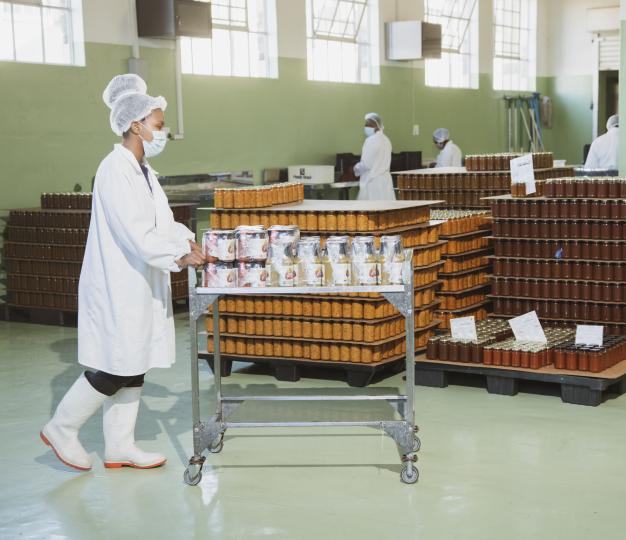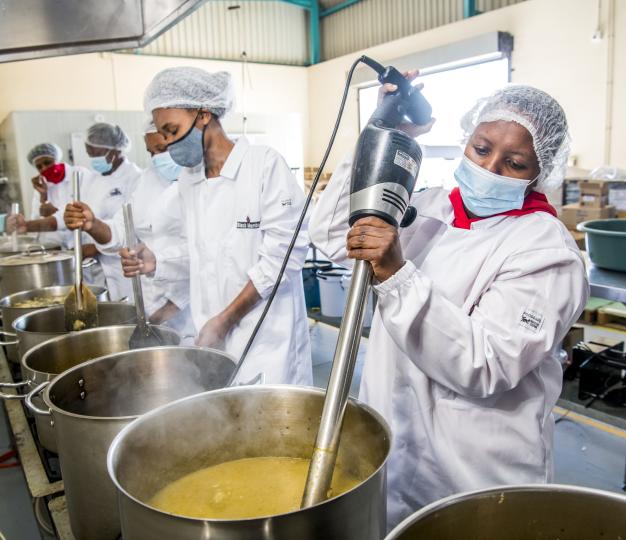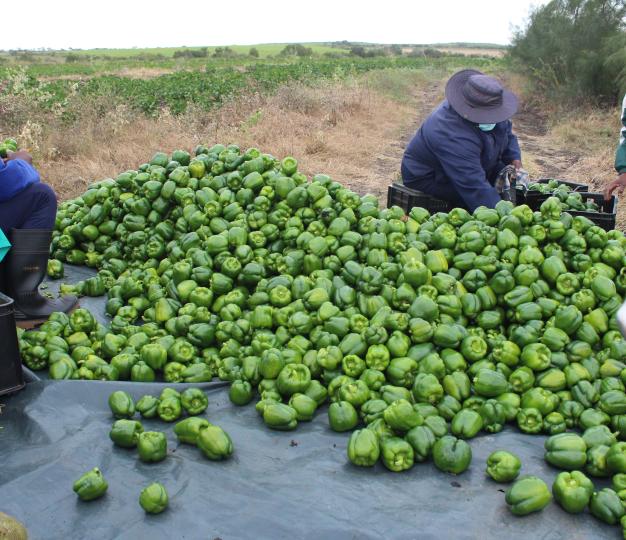Projects in Eswatini
이 페이지 보기
- Support to Job Creation and the Investment Climate
- Support Programme to the Economic Partnership Agreement (EPA) Implementation in the Kingdom of Eswatini
- Eswatini Livestock Value Chain Development Project
- Skills for youth employment, entrepreneurship and empowerment project
- Support to Agriculture value chains
- Hlonipheka Thriving for Dignity Programme
- Civil Society in Action (CSA)
- Youth and women Empowerment and Support (YES) project – Together we can
The basis for the Multi-annual Indicative Programme (MIP) 2021-2027 is defined by the Eswatini national strategic policy framework including the National Development Plan (NDP) 2019/20 - 2021/22 and the Strategic Roadmap 2019-2023. The Plan guides the allocation of national resources to achieve the key development agenda and priorities set by Government. The MIP seeks to bring the EU support as close as possible to people in vulnerable situations to address the citizens by working, where possible, with and through civil society organisations and the private sector, while encouraging a continued comprehensive and inclusive dialogue among all national stakeholders. To achieve maximum impact, the EU cooperation with Eswatini will concentrate on one priority area, Human Development and Social Inclusion, embracing the standard of living and education dimensions of human development through a focus on two interlinked sectors:
- Market-driven vocational education and training (TVET), and
- Empowerment of disadvantaged youth and women in vulnerable situations
Under these sectors, gender equality, girls’ and women empowerment will be pursued as a horizontal priority in line with the objectives of the EU’s Gender Action Plan (GAP) III.
Support to Job Creation and the Investment Climate
The low cash-flow, lack of access to finance, reduced diversity of products and markets are some of the reasons that make Micro, Small and Medium Enterprises (MSMEs) more vulnerable. Through the programme implemented by International Trade Center (ITC), MSMEs get the needed support to diversify their markets and products, to add value to their products and to improve their management skills which will in turn help them to better face economic challenges. The main objective of this EUR 5 million (SZL 100 million) EU funded programme is to tackle the economic slowdown and to improve livelihoods of smallholder farmers and workers in Eswatini by creating better jobs and growth.
Support Programme to the Economic Partnership Agreement (EPA) Implementation in the Kingdom of Eswatini
This EUR 6 million (SZL 120 million) EU programme implemented by International Trade Center (ITC), focuses on supporting Micro, Small and Medium Enterprises (MSMEs), mostly on the ones that have the potential to export to regional and European markets. Working together with the buyers from the start, this programme transfers expertise to companies, which will prepare them to attract investors and sell worldwide.
This action furthermore aims to improve the Public-Private Dialogue through the support to the implementation of a State Business Relations Framework. This Framework will work as a competitiveness forum that can identify key national issues affecting the competitiveness of the business sector, particularly the MSME sector, thus impeding growth and job creation.
In complementarity with the Support to Job Creation and the Investment Climate, this programme works to increase the competitiveness and sustainability of the Eswatini Micro, Small Medium Enterprises (MSMEs), Social Enterprises (SEs) and Producer Associations through the reinforcement of the support institutions, the establishment of public-private alliances, and the improvement of the access to finance and investments.
Eswatini Livestock Value Chain Development Project
The Eswatini Livestock Value Chain Development Project is a EUR 8.25 million (SZL 165 million) project implemented by International Trade Center (ITC) that focuses on improving smallholder livestock productivity, facilitating an inclusive, efficient and transparent markets, and strengthening the competitiveness and value addition capabilities for MSMEs.
The project seeks to build the capacity of individual farmers, cooperatives, abattoirs, and other value chain players including support institutions, to enhance the performance of the beef, goats, and associated value chains. Critical effort is focused on improving livestock breeding, nutrition, animal health and commercialisation of smallholder farmers.
The four chiefdoms selected for pilots in the ELVCDP program are Gangakhulu in Lubombo Region, Mahlangatsha in Manzini Region, Zinyane in Hhohho Region and Luhlekweni in Shiselweni Region. There are however actions designed to cover whole of Eswatini, especially those focused on SMMEs support. The project complements Support to Job Creation and the Investment Climate and the Support to the Implementation of the EU-SADC European Partnership Agreement (EPA).
Skills for youth employment, entrepreneurship and empowerment project
This project with a total budget of EUR 15,3million (SZL 306 million), implemented by GIZ the German Cooperation Agency (EU contribution EUR 14 million - SZL 280 million),aims at supporting the youth, women and other disadvantaged groups, by enhancing their skills through market-driven technical vocational education and training (TVET), and alliances with the private sector, for employability and self-employment. The target groups of the programme are the young people aged 15 to 35 years.
By addressing the high level of youth unemployment and by contributing to the creation of more decent jobs, the action aims at contributing to SDG 4 “Ensure inclusive and equitable quality education and promote lifelong learning opportunities for all” and SDG 5 “Gender equality and women’s empowerment”. The action will facilitate acquisition of relevant skills and access to employment, self-employment, and entrepreneurial opportunities by strongly involving the private sector in TVET activities with specific demands for skilled labour in priority sectors such as renewable energy/energy efficiency, agri-food/agro-processing, hospitality and sustainable tourism, ICT and creative industries, manufacturing including textiles.
The Eswatini Alliances: Skills for Economic and Social Inclusion Project
This project is implemented by the International Trade Centre (ITC) and funded by the EU for a total budget of EUR 3,5 million (SZL 70 million). The action aims at strengthening the delivery of employability, entrepreneurial and life skills for disadvantaged and vulnerable women and youth in Eswatini.
The action targets disadvantaged and vulnerable groups in Eswatini and these include but not limited to vulnerable youth and women, people with disabilities and other disadvantaged and vulnerable groups.
Khetsimphilo - choose life project
The ''Khetsimphilo - choose life'' project addresses two critical challenges in the siSwati society: mental health and gender equality, notably faced by vulnerable youth. The action aims to empower marginalised persons by enhancing their economic and social inclusion.
This EUR 4 million (SZL 82,5 million) project will be implemented by the Finnish Red Cross (FRC) in partnership with the Baphalali Eswatini Red Cross Society (BERCS) and selected Civil Society Organizations (CSOs). The action embodies a two-tier strategy based on strengthening community-level Mental Health Services and Psychosocial Support (MHPSS), on one side, and promoting gender equality through reduction of school dropout, support of youth reintegration, gender-based violence (GBV) prevention and response, Sexual and Reproductive Health and Rights (SRHR) awareness on the other. The action will rely on the collaboration of local authorities, traditional structures and civil society thriving to a real behavioural change.
Support to Agriculture value chains via sustainable and inclusive energy investment
The Support to Agriculture value chains via sustainable and inclusive energy investments in Eswatini programme (EUR 7.45 million) expected outputs are the improvement of the business environment in the renewable energy sector and the increase of investments in renewable energy or energy efficiency projects in support of key agriculture value chains. With the energy issue becoming more relevant to the sector, and to the economy in general, this EU intervention is in synergy with the Government of Eswatini’s energy master plan. Among other activities of this programme, there is the setting up in Eswatini of a EUR 5 million ElectriFI country window.
Hlonipheka Thriving for Dignity Programme
The CSO –LA projects in Eswatini have been building the capacity of the civil society in terms of project management and they strengthened the cooperation among the different organisations. The projects are based on the recognition of the need for coordinated and joint action of concerned CSOs to demand necessary reforms.
CSO-LA projects in Eswatini tackle the key relevant issues related to the enforcement of the democratic governance in the country, and in particular of the freedom of expression and of assembly, bridging the existing gaps in communication among the stakeholders and reducing the differences among the interests at stake. This is believed to contribute concretely to set the basis for a more conducive environment, where human rights are protected, promoted and enjoyed, as well as gender equality and empowerment of women is fostered.
Civil Society in Action (CSA)
The CSA project (EUR 3 million – SZL 60 million) aims to contribute to the long-term impact of enhancing the role of civil society (CSOs) and community-based organisations (CBOs) in Eswatini by promoting the fundamental values of good governance, policy development and the protection of human rights. These objectives are pursued through overcoming some key challenges experienced by civil society organisations and capacitating them, strengthening their capacities, effectiveness and sustainability, enhancing the collaboration and networking of CSOs and CBOs active in promoting women’s rights and gender equality, youth and vulnerable groups’ inclusion and participation, social cultural and promotion of economic rights and climate justice. This action aims also to facilitate the dialogue with the Government and International Organisations working in the country. CSOs and their national coalitions/platforms will be empowered to monitor, advocate and influence national policy and decision-making processes.
The project is implemented by COSPE- International NGO. Key stakeholder groups are represented by 8 national coalitions, 120 CSOs and CBOs (members of the coalitions) and staff/board members of the coalitions: CANGO, United Voices for the LGBTQI+ community, FSEJ-Foundation for Socio-Economic Justice, FODSWA-Federation of People living with disability in Eswatini, Liphimbo LaBoMake, SYN-Swaziland Youth Network, PELUM-Partipatory Ecological Land Use Management, Yini Loku.
Third-Party Financial Support (FSTP) is provided to coalitions, CSOs and CBOs to strengthen their operational capacity, management structure/tools and internal governance.
Youth and women Empowerment and Support (YES) project – Together we can
The YES project (EUR 1,568 million – SZL 31,360 million SZL) aims at promoting an inclusive society where women and youth play an active role as drivers of change in their community, their region, and their nation through strengthening capacities and opportunities of civil society and grassroots organisations to promote women and youth social inclusion, empowerment and rights. CSOs and Community groups promote an enabling environment for the promotion of women and youth rights, socio-economic inclusion and empowerment, and active participation in the decision-making processes in rural and urban areas.
The main activities are strengthening the coordination, networking and out-reach of Women and Youth coalitions through advocacy campaigns, exchange opportunities and the creation of a digital platform; strengthening of CSOs and grassroots groups in their capacity of responding to GBV and other violations of women and youth’s rights by setting up an emergency fund; development of Agendas of priorities for women and youth and engagement of different stakeholders from community and municipalities to national levels; implementation of community actions in response to the Agendas of women and youth in rural and urban areas; promotion of artistic and cultural expressions, including art exhibition and the establishment of a skate park in Mbabane and youth playgrounds in three rural communities; provision of seeds grants and mentoring to women and youth businesses in rural communities following business trainings for women and youth.
The project is implemented by COSPE INGO with the local partners: Gcama Mfati Women’s Development Network; Kwakha Indvodza; Swaziland Youth Empowerment Organisation-LUVATSI; Swaziland Rural Women Assembly – SRWA. Final beneficiaries include the households of the 16 communities and 2 municipalities (Siteki and Manzini) involved in the project.







